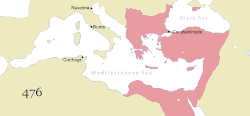
Back الإمبراطورية البيزنطية تحت حكم السلالة الأنجيلوسية Arabic Βυζαντινή Αυτοκρατορία υπό τη Δυναστεία των Αγγέλων Greek Imperio bizantino bajo la dinastía Ángelo Spanish امپراتوری بیزانس تحت خاندان آنجلوس Persian Dynastie des Anges French انجیلوس شاہی سلسلہ کے تحت بازنطینی سلطنت Urdu
Byzantine Empire
| |
|---|---|
| 1185–1204 | |
 The Byzantine Empire on the eve of the Sack of Constantinople, in 1204 AD. | |
| Capital | Constantinople |
| Common languages | Greek, Old Albanian, Armenian, Aromanian, Old Bulgarian, Old Anatolian Turkish and other South Slavic languages |
| Religion | Greek Orthodox Church |
| Government | Monarchy |
| Emperor | |
• 1185–1195; 1203–1204 | Isaac II Angelos |
• 1195–1203 | Alexios III |
• 1203–1204 | Alexios IV |
• 1204 | Alexios V |
• 1204 | Constantine Laskaris |
| History | |
• Deposition of Andronikos I | 1185 |
• Sack of Constantinople by the Fourth Crusade | 1204 |
| History of the Byzantine Empire |
|---|
 |
| Preceding |
| Early period (330–717) |
| Middle period (717–1204) |
| Late period (1204–1453) |
| Timeline |
| By topic |
|
|
The Byzantine Empire was ruled by emperors of the Angelos dynasty between 1185 and 1204 AD. The Angeloi rose to the throne following the deposition of Andronikos I Komnenos, the last male-line Komnenos to rise to the throne. The Angeloi were female-line descendants of the previous dynasty. While in power, the Angeloi were unable to stop the invasions of the Turks by the Sultanate of Rum, the uprising and resurrection of the Bulgarian Empire, and the loss of the Dalmatian coast and much of the Balkan areas won by Manuel I Komnenos to the Kingdom of Hungary.
Infighting among the elite saw Byzantium lose substantial financial capability and military power. The previous policies of openness with Western Europe, followed by the sudden massacre of Latins under Andronikos, had preceded the rule of the Angeloi making enemies among Western European states. The weakening of the empire under the Angeloi dynasty resulted in the partitioning of the Byzantine Empire when in 1204, soldiers of the Fourth Crusade overthrew the last Angeloi Emperor, Alexios V Doukas.